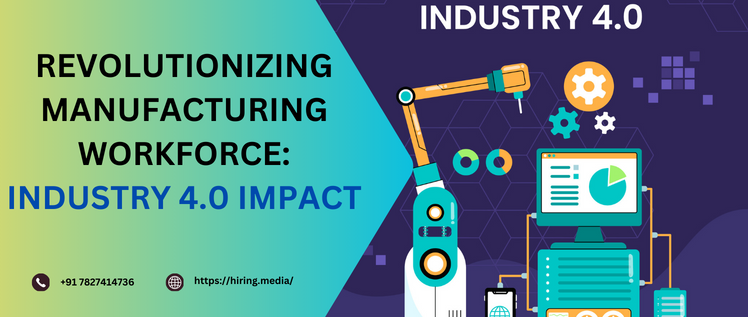The factory floor of yesterday is a far cry from the one we see emerging today. Industry 4.0, the fourth industrial revolution, is transforming the manufacturing landscape at an unprecedented pace. Imagine a world where intelligent machines collaborate seamlessly with human workers, data flows freely, and factories operate with unparalleled efficiency. This is the reality that Industry 4.0 is ushering in, and it’s having a profound impact on the manufacturing workforce.
Industry 4.0 is a confluence of cutting-edge technologies like artificial intelligence (AI), robotics, the Internet of Things (IoT), and big data analytics. These technologies are automating repetitive tasks, optimizing production processes, and enabling real-time decision making. While some fear that manufacturing Industry 4.0 will lead to widespread job displacement, the reality is far more nuanced. This revolution is not about replacing human workers; it’s about creating a new paradigm of human-machine collaboration.
The Impact of Industry 4.0 on the Workforce:
Industry 4.0 is fundamentally changing the skillsets needed to thrive in the manufacturing sector. Here’s a glimpse into the evolving landscape:
Rise of the Tech-Savvy Worker: The future factory worker will need to be comfortable working alongside intelligent machines. Basic tech literacy and the ability to understand and utilize data will be essential.
Upskilling and Reskilling: The manufacturing Industry 4.0 revolution necessitates continuous learning. Workers will need to upskill or reskill to adapt to new technologies and stay relevant in the job market.
Demand for Specialized Skills: While some jobs may be automated, new opportunities are emerging. There will be a growing demand for workers with specialized skills in areas like data analysis, robotics maintenance, and cybersecurity.
Evolving Work-Human Collaboration: Industry 4.0 is paving the way for a more collaborative work environment. Humans will focus on tasks that require creativity, problem-solving, and critical thinking, while machines handle the repetitive and data-driven aspects of production.
Elevate your tech career with our leading IT recruitment agency. We specialize in matching skilled professionals with cutting-edge companies, ensuring you find the perfect fit for your expertise and ambitions. Partner with us and take the next step towards your dream IT role!
Preparing for the Future of Manufacturing:
The Industry 4.0 revolution presents both challenges and opportunities for the manufacturing workforce. Here are some ways to prepare for the future:
Embrace lifelong learning. Make a commitment to continuous learning. Take online courses, attend workshops, and stay up-to-date on the latest industry trends. Develop data literacy. In the era of big data, mastering the collection, analysis, and interpretation of data is essential. There are numerous online resources and courses available to help you develop this valuable skill.
Sharpen your soft skills. Though technical skills hold significance, never overlook the influence of soft skills. Communication, collaboration, critical thinking, and problem-solving will remain essential for success in the manufacturing Industry 4.0 workplace. Network and collaborate. Stay connected with industry professionals, attend conferences, and build your network. Collaboration is key to navigating the ever-changing manufacturing landscape.
The Future of Jobs in Manufacturing
So, what will the manufacturing Industry 4.0 workforce look like? Here are some trends to watch:
Tech-Savvy Talent: The ability to understand, operate, and troubleshoot new technologies will be a major asset. Workers who can bridge the gap between the physical and digital worlds will be highly valuable.
Data Analytics Expertise: Making sense of the vast amount of data generated by connected machines and production processes will be crucial. Data analysis skills will be essential for optimizing operations and making data-driven decisions.
Lifelong Learning Mindset: The pace of technological change is accelerating. Workers will need to be adaptable and embrace continuous learning to stay relevant in the evolving manufacturing landscape.
Unlock your career potential with our premier recruitment agency in Delhi, connecting talented professionals with top-tier opportunities. Let us navigate your career path together!
The Future of Manufacturing is Human-Machine Collaboration
Industry 4.0 is not a job-killing machine; it’s a catalyst for a new era of manufacturing. The future lies in human-machine collaboration, where workers leverage technology to become more efficient, productive, and innovative. By embracing lifelong learning, developing the right skillsets, and fostering a culture of collaboration, the manufacturing workforce can not only survive but thrive in the Industry 4.0 revolution.
Therefore, how can you leverage this transformation to your benefit? Upskill, reskill, and embrace the exciting possibilities that Industry 4.0 presents. The future of manufacturing is bright, and it’s being shaped by a workforce that is both tech-savvy and human-centered. Are you ready to be a part of it?
Frequently Asked Questions (FAQs)
Q1: What is Industry 4.0?
Ans: Industry 4.0 refers to the fourth industrial revolution, characterized by the integration of digital technologies into manufacturing processes to create smart, interconnected systems.
Q2: How does Industry 4.0 impact the manufacturing workforce?
Ans: Industry 4.0 revolutionizes the manufacturing workforce by introducing automation, artificial intelligence, and data analytics, leading to increased efficiency, productivity, and innovation. However, it also requires upskilling and reskilling of workers to adapt to new technologies and roles.
Q3: What are the benefits of Industry 4.0 for manufacturers?
Ans: Industry 4.0 offers numerous benefits, including improved operational efficiency, predictive maintenance, cost reduction, customization capabilities, and enhanced product quality.
Q4: What challenges does Industry 4.0 pose for the manufacturing sector?
Ans: Challenges associated with Industry 4.0 include the need for substantial investment in technology infrastructure, cybersecurity risks, workforce skill gaps, and potential job displacement due to automation.
Q5: How can manufacturers prepare their workforce for Industry 4.0?
Ans: Manufacturers can prepare their workforce for Industry 4.0 by investing in training and education programs to develop digital skills, fostering a culture of continuous learning and innovation, and implementing change management strategies to facilitate the transition to new technologies.

